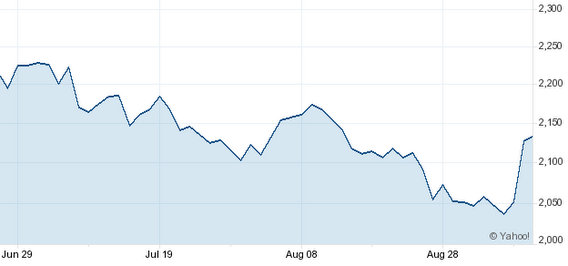
Photo: chinaphoto
Translated by Andrew Vanburen from a Chinese-language piece in Securities Daily
First Beijing opens its pursestrings in a big way, and now Washington is about to follow suit with its QE3.
Investors are hoping this will keep the charge in the recent upward-trending Chinese stock markets.
The benchmark Shanghai Composite – the chief Index for A- and B-shares trading in Shanghai and Shenzhen – finished Friday up 0.64%, but ended another weak week down 0.21% for the five days.
Stepping back and taking a more panoramic look at the Chinese capital market, shares are down 3.4% from the beginning of the year and a more staggering 15% from year-ago levels.
However, the month of September has been a different kettle of fish altogether.
On September 5, the Shanghai Composite closed at 2,038.
But just nine days later – Friday, September 14 -- the Index closed at 2,124, a healthy 4.2% rise from September 5 levels.
So what’s needed to keep shares buoyant and investors smiling?
First of all, firms need to clear out standing inventory sooner rather than later so more just-in-time, market-based production can resume and capacity levels begin to rise again where necessary, thus creating jobs and broader stability.
When the economy is humming along, investors are in a more likely mood to buy more shares.
Furthermore, they are financially able to afford new share purchases in a rising economy.

Also, when an enterprise is not encumbered with a burdensome inventory backlog, they can maintain high average selling prices (ASP) and profit margins into the bargain, all of which make their operations more viable and their shares more desirable.
Second, there needs to be a more concerted three-pronged effort to eradicate or weaken certain drags on the market.
Regulators need to limit new listings to a healthy level and also prevent a flood of firms leaving in an exodus when things get overly bearish.
In addition, much more needs to be done to both curtail overly generous perks for executives as well as minimizing or eliminating the ongoing cases of insider trading.
When these campaigns are in full swing and bearing obvious fruit, a lot of market naysayers and reluctant investors will be far more willing to jump back into a market they consider fairer and safer.
Third, the market regulator, fund managers and market analysts need to work more diligently – yet honestly and above board – to collectively drum up confidence in the domestic equity markets.
If done convincingly and without an agenda, the results will be clearly manifested in more buying activity, as they always are, and a situation of positive reinforcement will prevail.
Fourth, houses need to be more aggressive in finding gems and laggards in the market, and make forthright and forceful recommendations one way or the other in order to stimulate more knowledge among investors of a wider variety of options as well as help ordinary investors better manage risks.
Finally, those with the power of the pen should do more to bring attention to emerging industries in order to whet investor appetite for these high growth-potential plays and promote their roles in the economy.
See also:
GOODY BASKET: Which PRC Brokerages Have Best Perks?
EVERYBODY’S HURTING: Third Of ChiNext Firms See Plunging Profits
More Skidding Seen For China Shares
SEASONAL SELECTIONS: Five China Shares Likely To Shine







